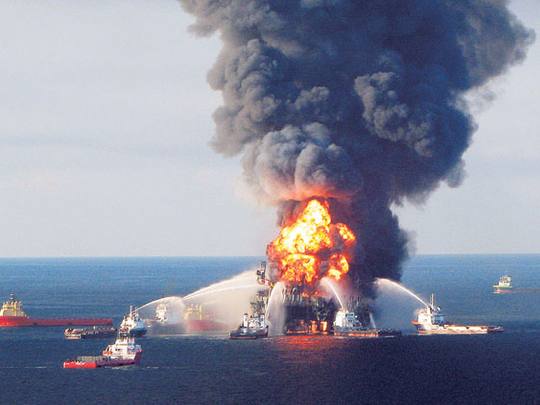
On Monday, barring last-minute dramas, BP and the other companies involved in the 2010 Deepwater Horizon disaster will appear in court in New Orleans for the largest and most complex trial this century.
At its heart is an issue that is not clearly established in US law: the difference between ordinary and gross negligence. On that distinction hangs both BP’s civil penalties under the Clean Water Act, and possible punitive damages, giving outcomes that vary by tens of billions of dollars.
Almost everyone involved would have preferred to agree settlements rather than take the risk of going to trial. The fact they are now set to face each other in court shows their expectations are still a long way apart.
Last-minute deals “on the courthouse steps” are still possible. The trial was scheduled to start a year ago, but the day before it was due to commence, BP and the private sector plaintiffs said they were close to a settlement, and the judge agreed to a delay. Since then, the date has been pushed back several times, but plans for the trial scheduled for Monday are still broadly the same.
The US government, state and local governments from the Gulf of Mexico region and more than 130,000 private sector claimants are suing, in various permutations, three principal companies: BP, which owned the Macondo well and was in charge of the project to drill it; Transocean, owner and operator of the Deepwater Horizon rig; and Halliburton, which provided the cement intended to seal the well.
Steve Herman, a co-lead counsel for the private sector plaintiffs, says: “This trial is no different at all from the one that was scheduled to start a year ago. You have exactly the same liability questions being decided over exactly the same parties.”
BP’s settlement of claims from gulf coast residents and businesses, which it now expects to cost $8.5 billion (Dh31.22 billion), means it no longer faces legal action from thousands of them. The fund to administer the settlement, run by Louisiana lawyer Patrick Juneau, has had claims from about 96,000 individuals and businesses. However, there are still an unknown number of private sector claimants who are not eligible for that settlement because they are based a long way from the gulf coast, for example, or have chosen to opt out. They are continuing to pursue their actions against BP.
All the private sector claimants are also seeking damages from Transocean and Halliburton.
The essential facts of the disaster are well established. As the Deepwater Horizon rig was planning to leave the completed Macondo well, BP and Transocean staff misinterpreted critical test results and assumed that the well had been secured with Halliburton’s cement, when in reality oil and gas were leaking from it. They carried on with procedures for disconnecting from the well, allowing oil and gas to surge up the pipe to the rig, where they ignited.
The main question for the trial, which will be addressed in its first phase over the coming months, is the interpretation of those actions. Herman says: “We always believed from the very beginning that all three companies were liable for gross negligence, and it is still the private plaintiffs’ intention to find that.”
Luther Strange, attorney-general for Alabama, one of the coastal states hit by the spill that have filed damages claims worth a total of more than $34 billion (Dh124.88 billion), agrees.
“We are very anxious for the trial to start on Monday,” he told the Financial Times. “We have been working very closely with the US government and we think we have a very strong case to prove gross negligence.”
Lawyers from the US Department of Justice argued in a court filing last year that BP had a “culture of corporate recklessness” and had acted with “gross negligence or wilful misconduct”. It also accused Transocean of acting with gross negligence.
Establishing gross negligence matters for the government because it raises the maximum civil penalty possible under the Clean Water Act from $1,100 per barrel spilled through ordinary negligence to $4,300 per barrel.
Using the DoJ’s estimate that 4.1 million barrels were spilled into the gulf — it has accepted BP’s argument that the 810,000 barrels collected by containment systems should not be liable for penalties — that makes the difference between maximum penalties $4.5 billion and $17.6 billion.
Gross negligence is also important for the damages sought by the private sector plaintiffs and state and local governments. A finding of ordinary negligence would allow claims for compensatory damages to make good financial losses and harm done to the environment. Gross negligence would justify punitive damages on top.
In the case of the 1989 Exxon Valdez spill, the US Supreme Court ruled that punitive damages could be the same again as the compensatory damages. Herman’s team believes the circumstances of the Deepwater Horizon case mean the appropriate multiple could be greater than that.
All three companies have denied the allegation of gross negligence.
BP and Transocean have pleaded guilty to criminal charges in settlements with the DoJ, and accepted that their negligence was a cause of the accident. Those admissions will be taken as evidence by Carl Barbier, the trial judge. Both companies insist, however, that they have admitted only ordinary, not gross negligence, and say the blame is shared. BP says it was negligent along with Transocean and Halliburton, while Transocean says it was working under BP’s supervision.
The difficulty for Judge Barbier in deciding whether that conduct was gross negligence is that there are few relevant precedents. David Uhlmann, a former top environmental lawyer at the DoJ, now at the University of Michigan, says the government will need to prove that BP “substantially deviated from its duty of reasonable care” but “the governing legal standard is not particularly clear”.
There is one possibly relevant precedent in a case Judge Barbier presided over in 2001: an appeal court case in which he struck down a finding of gross negligence from a district court against Halliburton, which had been sued over a gas well blowout by a company called Houston Exploration.
The issue was whether a Halliburton employee’s conduct amounted to “a want of even slight care and diligence’’, he said, and in that case it did not. Whichever way he decides in the Deepwater Horizon case, the scope for uncertainty means disappointed parties can be counted on to appeal.
— Financial Times












